This list breaks down Bible verses to help readers understand what scripture says about food.
Delving into biblical teachings about food reveals profound spiritual insights and practical wisdom. From sustenance in Genesis to Jesus’ declarations in the Gospels, these verses guide us on nourishment, generosity, and God’s enduring provision. Whether you’re looking for inspiration, understanding, or encouragement, these scriptures offer everything you need to grasp the divine connection between faith and food.
Genesis 1:29 – “Then God Said, ‘I Give You Every Seed-bearing Plant On the Face of the Whole Earth and Every Tree That Has Fruit With Seed in It. They Will Be Yours for Food.'”
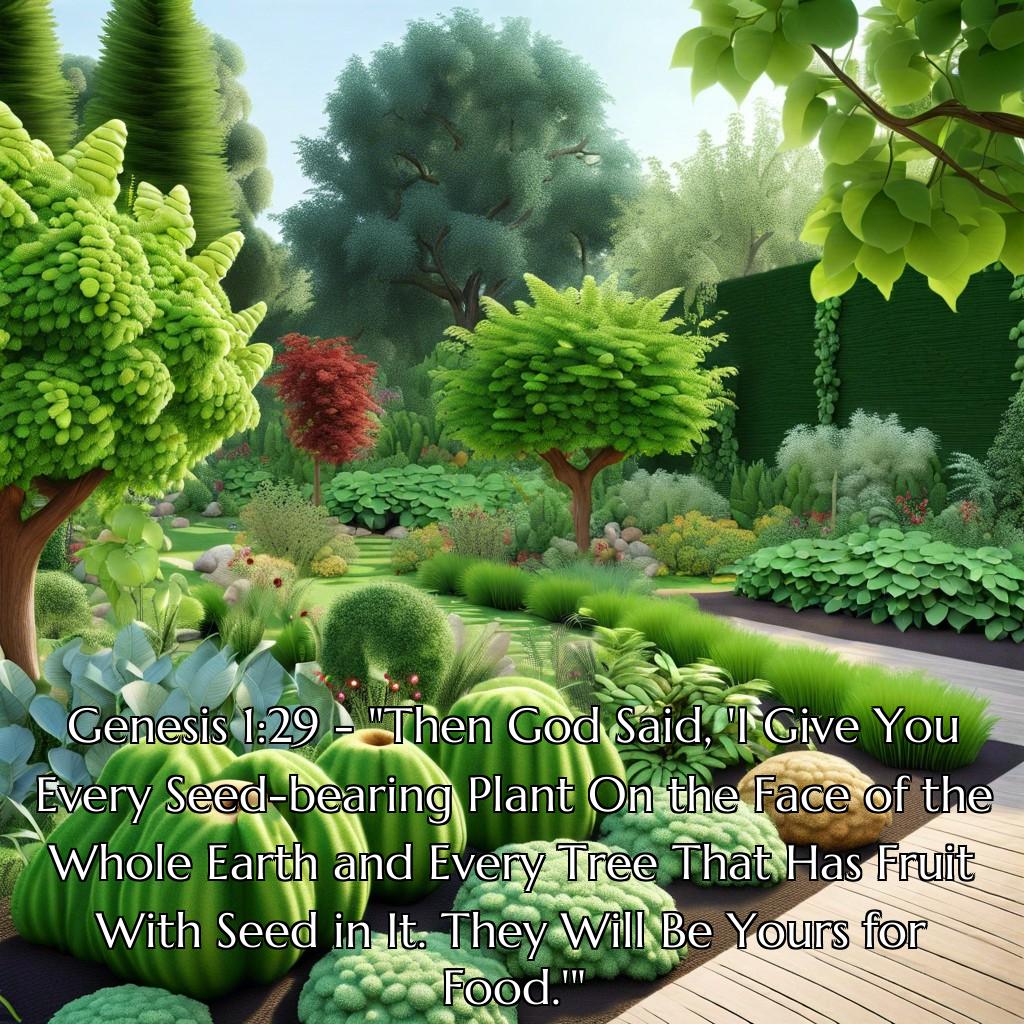
In this verse, God provides humankind with a foundational gift: plants and fruits as sources of sustenance. This establishes an early relationship between humans and the earth’s natural resources.
Here are some key points highlighted by this verse:
- God’s Provision: It underscores God’s role as a provider, offering everything we need to nourish our bodies.
- Plant-Based Diet: Initially, the diet prescribed by God consists of seed-bearing plants and fruits, which hints at a plant-based diet for optimal health and sustainability.
- Stewardship: Implicit is the responsibility humans have in cultivating and taking care of these resources. It is a call to sustainable living.
- Abundance: The verse reassures that God created an abundance of food sources to meet our needs.
These points emphasize a holistic approach to viewing food—as nourishment, a gift, and a responsibility.
Exodus 16:4 – “Then the LORD Said to Moses, ‘I Will Rain Down Bread From Heaven for You. The People Are to Go Out Each Day and Gather Enough for That Day. In This Way, I Will Test Them and See Whether They Will Follow My Instructions.'”
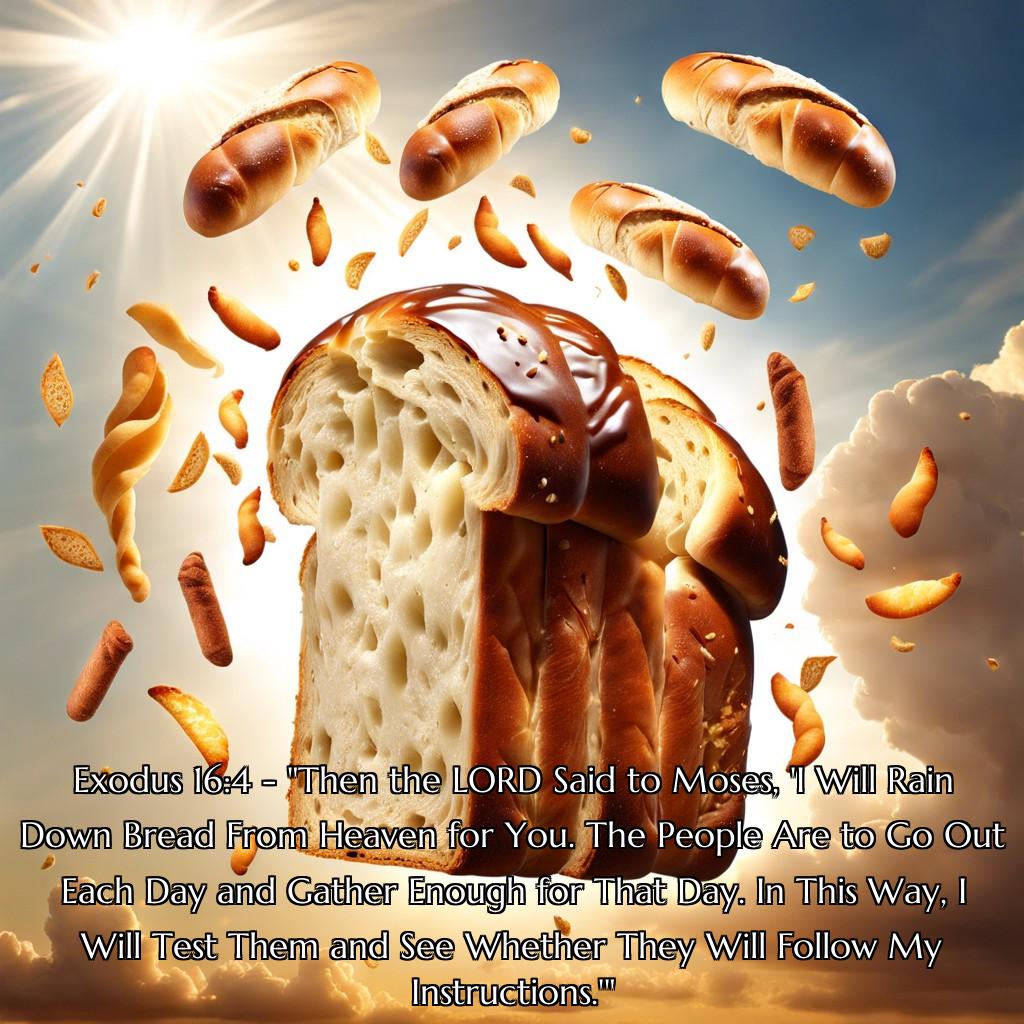
In this verse, God promises to provide for the Israelites during their journey in the desert. He sends manna, often described as bread from heaven, to sustain them. This provision is not just about meeting physical needs but also serves as a test of faith and obedience.
Key points to consider:
First, the daily gathering requirement emphasizes reliance on God. The Israelites must trust that He will provide enough for each day.
Second, it reinforces the discipline of following God’s instructions. They are not to hoard or stockpile, underscoring the importance of daily dependence on divine provision.
Lastly, this scenario foreshadows the significance of spiritual nourishment. Just as they relied on manna, believers today are encouraged to rely on God’s word daily.
The verse subtly intertwines physical sustenance with spiritual lessons, making it a powerful reflection on trusting God’s provision.
Psalm 136:25 – “He Gives Food to Every Creature. His Love Endures Forever.”

God’s provision is a central theme here. His generosity isn’t limited to humans but extends to every creature. This speaks to His boundless compassion and care for all life.
God’s provision is continuous. The phrase “His love endures forever” implies that His care is not a one-time act but an ongoing promise.
It reflects divine love. God’s provision of food is a testament to His unwavering and enduring love.
It’s a call to gratitude. Recognizing God’s provision in daily sustenance encourages a thankful heart.
Contemplating God’s care for all creatures enhances our understanding of His vast and encompassing love, bridging His creation with His eternal compassion.
Proverbs 15:17 – “Better a Small Serving of Vegetables With Love Than a Fattened Calf With Hatred.”

This proverb highlights the importance of harmony and love over material abundance. Several key concepts are at play here:
Quality of Relationships: It’s better to have a modest meal with loving relationships than a luxurious feast filled with strife.
Emotional Well-being: Love and peace contribute more to our overall well-being than the richness of our food.
Contentment: Finding joy and satisfaction in simpler things fosters a more fulfilling life.
Value of Love: This verse underscores that love enriches our lives more than any material possession ever could.
Ultimately, it’s a reminder to prioritize love and relationships over wealth and indulgence.
Matthew 6:11 – “Give Us Today Our Daily Bread.”
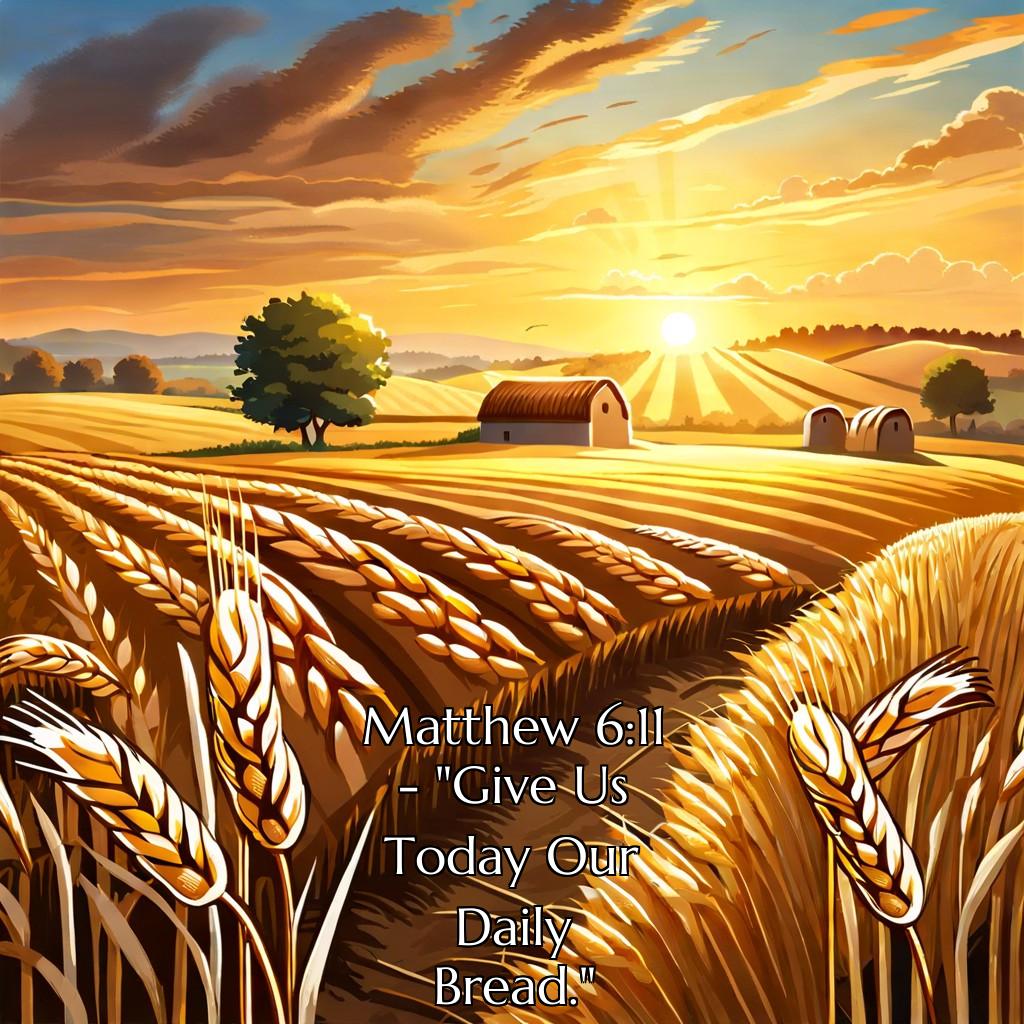
This verse forms part of the Lord’s Prayer, underscoring the importance of relying on God for our daily needs.
Firstly, it reminds us to live in the present, focusing on today’s provisions without worrying excessively about the future. Trusting God daily fosters a deeper faith and reliance on His care.
Secondly, it signifies dependence. It’s an acknowledgment that all our sustenance, both physical and spiritual, comes from God.
Thirdly, it encourages gratitude. By praying for our daily bread, we recognize and appreciate God’s continuous blessings, no matter how small.
Lastly, it creates a sense of community. As we pray for our needs, we become more aware of others’ needs, encouraging us to share and support one another.
Matthew 4:4 – “Jesus Answered, ‘It Is Written: Man Shall Not Live On Bread Alone, but On Every Word That Comes From the Mouth of God.'”

Jesus emphasizes the importance of spiritual nourishment. Physical food sustains our bodies, but it is God’s word that sustains our souls.
- This verse reminds us that:
- Our spiritual well-being is as crucial as our physical health.
- Living a life of faith involves more than just meeting material needs.
- Trusting in God’s word can provide guidance and strength in times of temptation and hardship.
Jesus quotes this during his temptation in the wilderness, showing the power of Scripture to combat physical desires. It encourages believers to seek a deeper, more fulfilling relationship with God.
Luke 3:11 – “John Answered, ‘Anyone Who Has Two Shirts Should Share With the One Who Has None, and Anyone Who Has Food Should Do the Same.'”

John’s directive emphasizes compassion and sharing as fundamental to a godly life. The verse underscores the importance of generosity, especially when one has more than enough.
Sharing food and clothing becomes an act of solidarity and love. Such gestures can unite communities and foster mutual respect.
This teaching advocates for practical faith. Actions speak louder than words, and sharing with those in need exemplifies living out one’s beliefs.
The focus is on immediate needs. Addressing hunger and lack of clothing directly impacts well-being and demonstrates genuine care.
Ultimately, these acts reflect God’s provision working through people. By sharing, individuals become conduits of divine love and provision for others.
John 6:35 – “Then Jesus Declared, ‘I Am the Bread of Life. Whoever Comes to Me Will Never Go Hungry, and Whoever Believes in Me Will Never Be Thirsty.'”
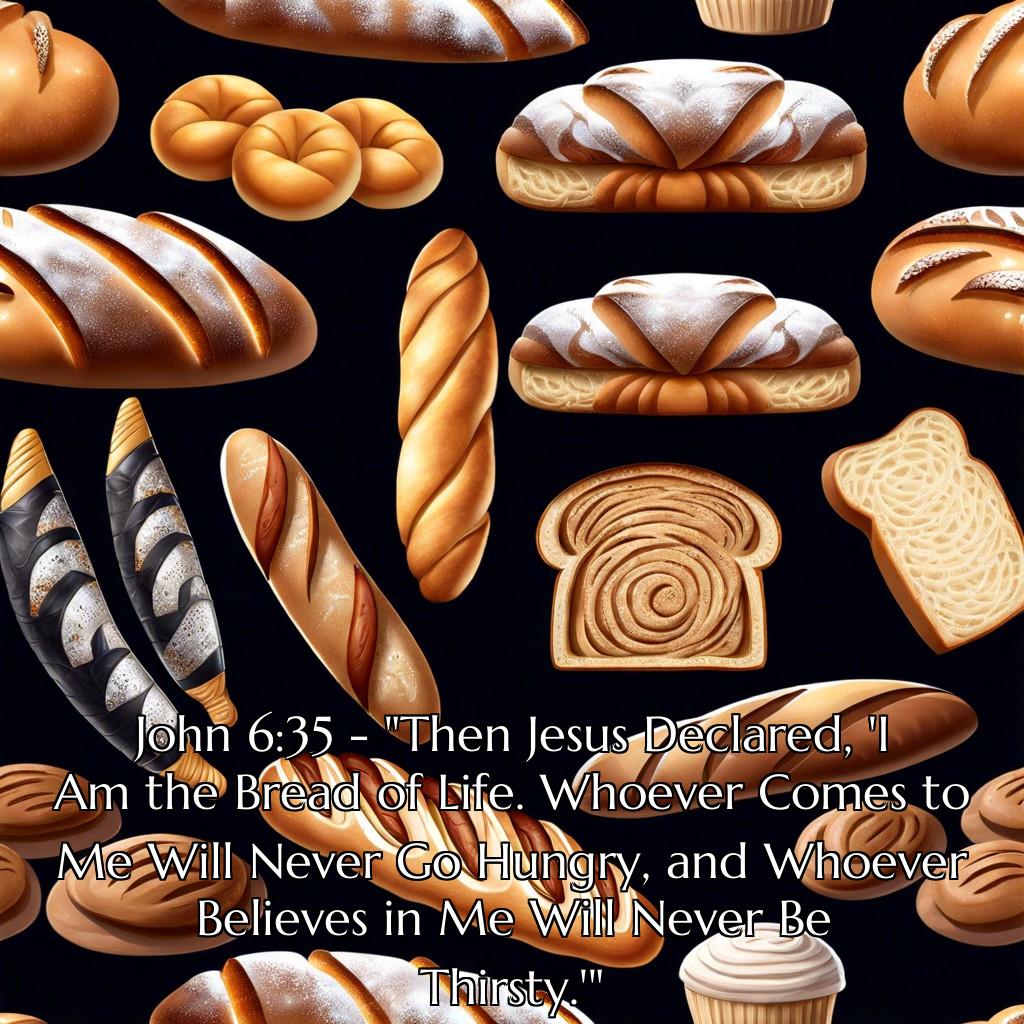
In this verse, Jesus uses the metaphor of bread to communicate deep spiritual truths.
Spiritual Sustenance: Just as bread is essential for physical life, Jesus is essential for spiritual life. He offers a nourishment that sustains us beyond physical hunger.
Satisfaction in Christ: Coming to Jesus means finding complete satisfaction. Believing in Him fills a deeper hunger and quenches a spiritual thirst.
Eternal Promise: Jesus is promising eternal fulfillment. Those who follow Him will experience an enduring form of sustenance that transcends earthly needs.
This verse invites us to see Jesus as the ultimate source of life and fulfillment, going beyond what the physical world can offer. It’s a profound reminder of the spiritual nourishment available through faith in Him.
1 Corinthians 10:31 – “So Whether You Eat or Drink or Whatever You Do, Do It All for the Glory of God.”

Paul emphasizes that our daily actions, including eating and drinking, should honor God. This is a call to mindfulness and gratitude in our everyday lives.
First, consider the source of your food. Acknowledge and give thanks to God who provides.
Second, make choices that reflect stewardship of your body, recognizing it as a temple of the Holy Spirit.
Third, celebrate meals with others, fostering community and building relationships, mirroring the communal nature of the church.
Lastly, use meals as opportunities for hospitality and generosity, mirroring Jesus’ own example. Sharing food can be a powerful act of love and service.
James 2:15-16 – “Suppose a Brother or a Sister Is Without Clothes and Daily Food. If One of You Says to Them, ‘Go in Peace; Keep Warm and Well Fed,’ but Does Nothing About Their Physical Needs, What Good Is It?”
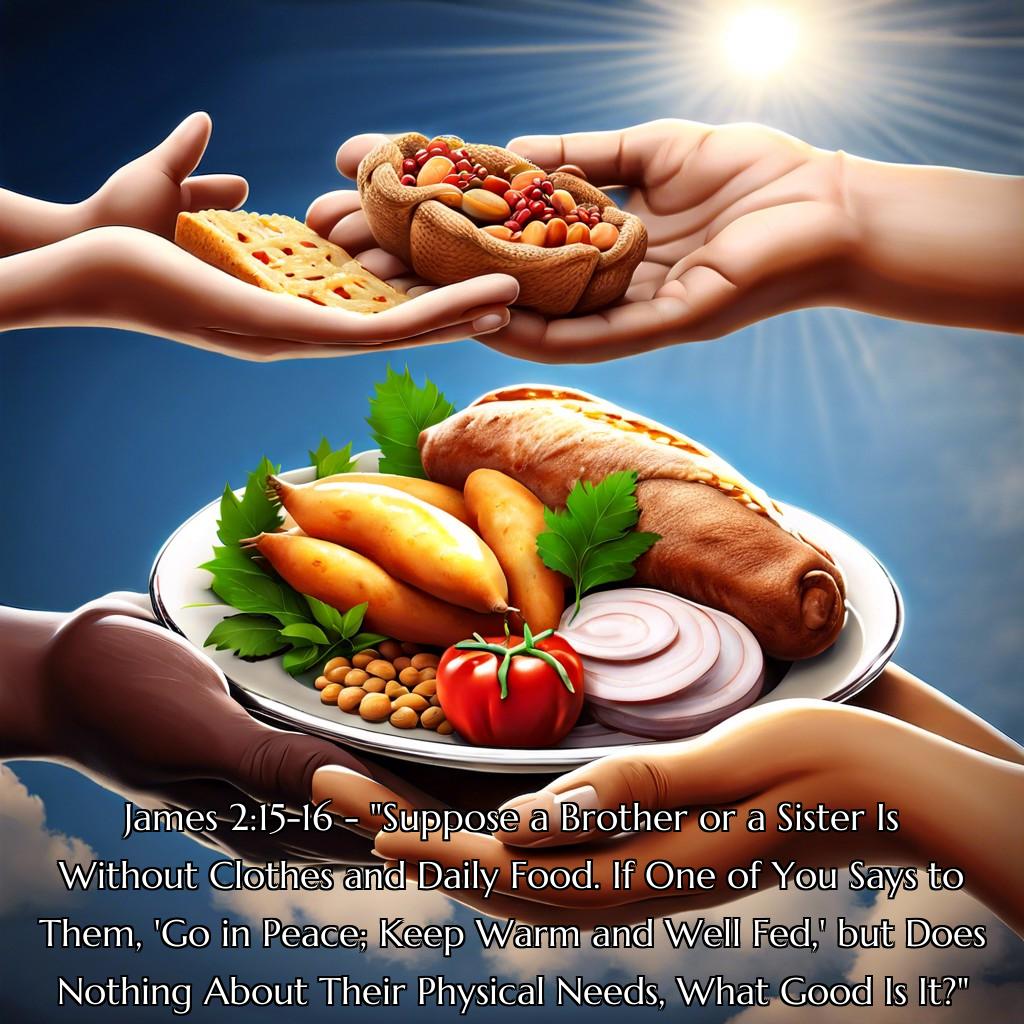
James emphasizes the importance of action in our faith. It’s not enough to offer kind words to someone in need; genuine faith requires us to address their physical necessities. This passage challenges believers to demonstrate their faith through tangible acts of kindness.
- We need to ensure that our faith translates into practical help.
- God calls us to be His hands and feet, meeting the needs of others.
- True compassion compels us to provide real assistance.
- Offering empty words without action is ineffective and hollow.
This directive underscores the Bible’s recurrent theme: love in action. It encourages believers to go beyond mere sentiment and make a real difference in people’s lives.





